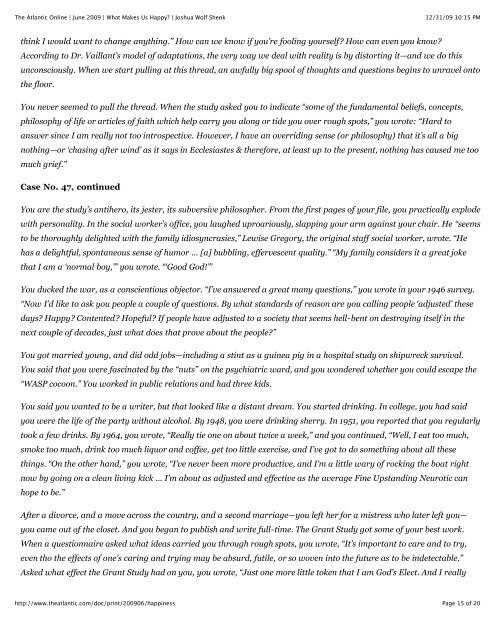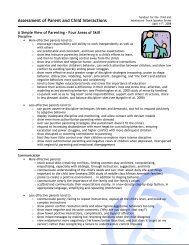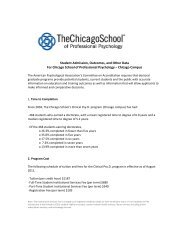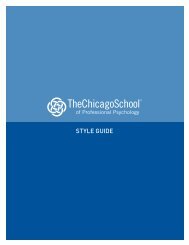Center for Academic Excellence Writing Assessment ... - eGo Main
Center for Academic Excellence Writing Assessment ... - eGo Main
Center for Academic Excellence Writing Assessment ... - eGo Main
You also want an ePaper? Increase the reach of your titles
YUMPU automatically turns print PDFs into web optimized ePapers that Google loves.
The Atlantic Online | June 2009 | What Makes Us Happy? | Joshua Wolf Shenk<br />
12/31/09 10:15 PM<br />
think I would want to change anything.” How can we know if you’re fooling yourself? How can even you know?<br />
According to Dr. Vaillant’s model of adaptations, the very way we deal with reality is by distorting it—and we do this<br />
unconsciously. When we start pulling at this thread, an awfully big spool of thoughts and questions begins to unravel onto<br />
the floor.<br />
You never seemed to pull the thread. When the study asked you to indicate “some of the fundamental beliefs, concepts,<br />
philosophy of life or articles of faith which help carry you along or tide you over rough spots,” you wrote: “Hard to<br />
answer since I am really not too introspective. However, I have an overriding sense (or philosophy) that it’s all a big<br />
nothing—or ‘chasing after wind’ as it says in Ecclesiastes & there<strong>for</strong>e, at least up to the present, nothing has caused me too<br />
much grief.”<br />
Case No. 47, continued<br />
You are the study’s antihero, its jester, its subversive philosopher. From the first pages of your file, you practically explode<br />
with personality. In the social worker’s office, you laughed uproariously, slapping your arm against your chair. He “seems<br />
to be thoroughly delighted with the family idiosyncrasies,” Lewise Gregory, the original staff social worker, wrote. “He<br />
has a delightful, spontaneous sense of humor … [a] bubbling, effervescent quality.” “My family considers it a great joke<br />
that I am a ‘normal boy,’” you wrote. “‘Good God!’”<br />
You ducked the war, as a conscientious objector. “I’ve answered a great many questions,” you wrote in your 1946 survey.<br />
“Now I’d like to ask you people a couple of questions. By what standards of reason are you calling people ‘adjusted’ these<br />
days? Happy? Contented? Hopeful? If people have adjusted to a society that seems hell-bent on destroying itself in the<br />
next couple of decades, just what does that prove about the people?”<br />
You got married young, and did odd jobs—including a stint as a guinea pig in a hospital study on shipwreck survival.<br />
You said that you were fascinated by the “nuts” on the psychiatric ward, and you wondered whether you could escape the<br />
“WASP cocoon.” You worked in public relations and had three kids.<br />
You said you wanted to be a writer, but that looked like a distant dream. You started drinking. In college, you had said<br />
you were the life of the party without alcohol. By 1948, you were drinking sherry. In 1951, you reported that you regularly<br />
took a few drinks. By 1964, you wrote, “Really tie one on about twice a week,” and you continued, “Well, I eat too much,<br />
smoke too much, drink too much liquor and coffee, get too little exercise, and I’ve got to do something about all these<br />
things. “On the other hand,” you wrote, “I’ve never been more productive, and I’m a little wary of rocking the boat right<br />
now by going on a clean living kick … I’m about as adjusted and effective as the average Fine Upstanding Neurotic can<br />
hope to be.”<br />
After a divorce, and a move across the country, and a second marriage—you left her <strong>for</strong> a mistress who later left you—<br />
you came out of the closet. And you began to publish and write full-time. The Grant Study got some of your best work.<br />
When a questionnaire asked what ideas carried you through rough spots, you wrote, “It’s important to care and to try,<br />
even tho the effects of one’s caring and trying may be absurd, futile, or so woven into the future as to be indetectable.”<br />
Asked what effect the Grant Study had on you, you wrote, “Just one more little token that I am God’s Elect. And I really<br />
don’t need any such tokens, thank you.”<br />
http://www.theatlantic.com/doc/print/200906/happiness<br />
Page 15 of 20





